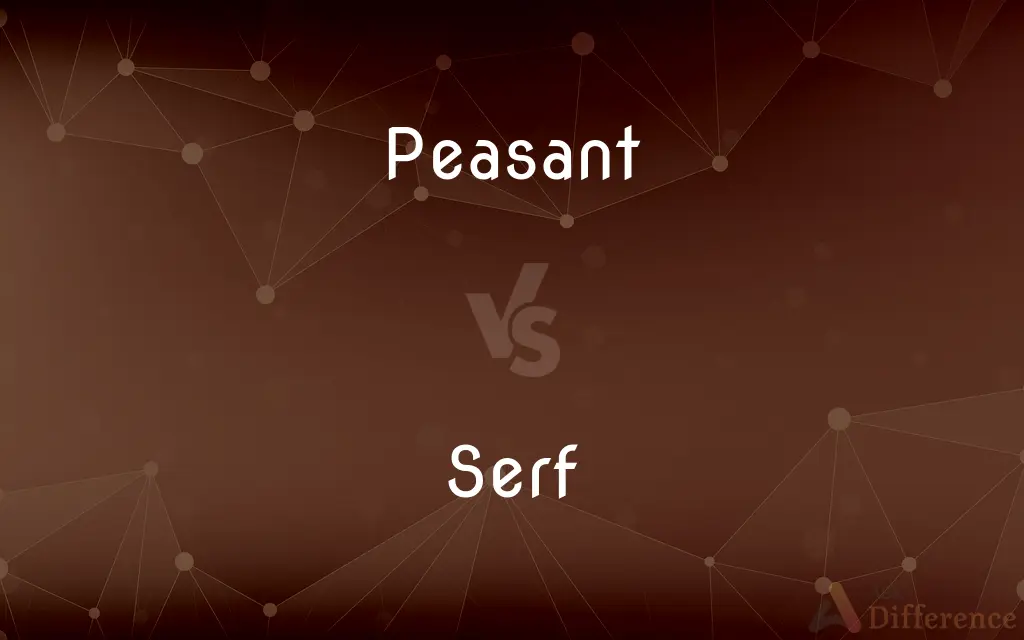Peasant vs. Serf — What's the Difference?
Edited by Tayyaba Rehman — By Fiza Rafique — Updated on October 27, 2023
"Peasant" refers to a rural laborer or farmer, especially in historical contexts; "Serf" is a laborer bound under feudalism, often to a specific plot of land or lord.

Difference Between Peasant and Serf
Table of Contents
ADVERTISEMENT
Key Differences
A Peasant is commonly understood as a rural laborer or small-scale farmer, especially in past societies. On the other hand, a Serf was a specific kind of laborer under the feudal system, tied to a particular estate or lord.
Peasants can own or rent their land and have a degree of personal freedom. Conversely, Serfs often didn't own the land they worked on; they were essentially bound to it and to the lord who owned that land.
It's important to note that not all Peasants were Serfs. While both primarily worked the land and were considered low in social hierarchy, Peasants had more autonomy compared to Serfs.
While the status of a Peasant varied across cultures and epochs, they generally had some rights and could engage in commerce or change occupation. In contrast, Serfs had limited rights, and their life decisions, such as marriage, often required their lord's approval.
Peasants were a broad category that could include various types of rural workers, from tenant farmers to landowners. In contrast, the term Serf was more specific, indicating a person's bound status within the feudal system.
ADVERTISEMENT
Comparison Chart
Nature
Rural laborer or farmer.
Laborer bound to a specific land or lord.
Land Ownership
Might own or rent land.
Typically did not own land.
Autonomy
Had personal freedom, could change jobs.
Limited personal rights, bound to their lord.
Societal Role
Varied but generally low in social hierarchy.
Specific role within the feudal system.
Grammatical Role
Noun.
Noun.
Compare with Definitions
Peasant
A small-scale farmer or rural laborer.
The peasant tilled his small plot of land daily.
Serf
A person with limited rights and freedom in medieval Europe.
As a serf, her life decisions were often dictated by her lord.
Peasant
An unsophisticated rural person.
The play portrayed him as a simple peasant with a heart of gold.
Serf
A laborer in feudalism bound to a specific land or lord.
The serf could not leave the estate without the lord's permission.
Peasant
A worker who performs agricultural tasks.
The peasants harvested the grain before winter.
Serf
An agricultural laborer under the manorial system.
The serf worked long hours in the fields but had little to call his own.
Peasant
A person of low social status, especially in historical contexts.
Peasants in the Middle Ages had limited rights.
Serf
A worker in a condition of servitude, bound to a master.
The serf's family had been tied to the same estate for generations.
Peasant
A person lacking refined manners, education, or artistic values.
The aristocrat considered anyone outside his class a peasant.
Serf
A member of the lowest feudal class, legally bound to a landed estate and required to perform labor for the lord of that estate in exchange for a personal allotment of land.
Peasant
A peasant is a pre-industrial agricultural laborer or a farmer with limited land-ownership, especially one living in the Middle Ages under feudalism and paying rent, tax, fees, or services to a landlord. In Europe, three classes of peasants existed: slave, serf, and free tenant.
Serf
An agricultural laborer under various similar systems, especially in Russia and eastern Europe in the 1700s and 1800s.
Peasant
A poor smallholder or agricultural labourer of low social status (chiefly in historical use or with reference to subsistence farming in poorer countries)
Peasant farmers
Serf
A person in bondage or servitude.
Peasant
A member of a class of small farmers and farm laborers, especially in a preindustrial or underdeveloped society.
Serf
A partially free peasant of a low hereditary class, attached like a slave to the land owned by a feudal lord and required to perform labour, enjoying minimal legal or customary rights.
Peasant
A person who lives in a rural area; a rustic.
Serf
A similar agricultural labourer in 18th and 19th century Europe.
Peasant
A person who is considered crude or uncouth; a boor.
Serf
(strategy games) A worker unit.
Peasant
A member of the lowly social class that toils on the land, constituted by small farmers and tenants, sharecroppers, farmhands and other laborers on the land where they form the main labor force in agriculture and horticulture.
Serf
A servant or slave employed in husbandry, and in some countries attached to the soil and transferred with it, as formerly in Russia.
In England, at least from the reign of Henry II, one only, and that the inferior species [of villeins], existed . . . But by the customs of France and Germany, persons in this abject state seem to have been called serfs, and distinguished from villeins, who were only bound to fixed payments and duties in respect of their lord, though, as it seems, without any legal redress if injured by him.
Peasant
A country person.
Serf
(Middle Ages) a person who is bound to the land and owned by the feudal lord
Peasant
(pejorative) An uncouth, crude or ill-bred person.
Serf
A person in a condition of debt bondage.
The serf worked tirelessly to pay off debts that seemed never-ending.
Peasant
(strategy games) A worker unit.
Peasant
(attributive) Characteristic of or relating to a peasant or peasants; unsophisticated.
Peasant class
Peasant
Lowly, vulgar; reprehensible; dishonest.
Peasant
A countryman; a rustic; especially, one of the lowest class of tillers of the soil in European countries.
Peasant
Rustic, rural.
Peasant
A country person
Peasant
One of a (chiefly European) class of agricultural laborers
Peasant
A crude uncouth ill-bred person lacking culture or refinement
Common Curiosities
Did all peasants own land?
No, while some peasants owned land, others rented or worked on someone else's land.
What primarily defines a "Peasant"?
A "Peasant" is typically a rural laborer or small-scale farmer, especially in historical contexts.
Could a serf choose to work elsewhere?
No, serfs were bound to their lords and the land, limiting their mobility and choices.
Is the term "Peasant" used in modern times?
While "Peasant" has historical origins, it can be used today, often derogatorily, to describe someone perceived as unsophisticated.
Which term has a broader meaning, "Peasant" or "Serf"?
"Peasant" has a broader meaning, encompassing various rural workers, whereas "Serf" is more specific to the feudal system.
What was a "Serf" in medieval Europe?
A "Serf" was a laborer bound under the feudal system, often to a specific plot of land or lord.
Were all serfs peasants?
While all serfs could be considered peasants due to their agricultural role, not all peasants were serfs.
Were there peasant revolts in history?
Yes, throughout history, there have been numerous peasant revolts against oppression and economic hardships.
Was serfdom a form of slavery?
While serfs had limited rights and were bound to lords, they weren't slaves; they had some personal rights and protections.
Did serfs receive any compensation for their work?
Serfs typically received protection and a place to live; they could also keep a portion of their produce.
Could a peasant become a serf or vice versa?
Historically, various circumstances could change a peasant's status, but moving from serfdom to freedom was challenging.
When did serfdom end in Europe?
Serfdom's decline began in the late Middle Ages, but it persisted in some areas until the 19th century.
Was serfdom exclusive to Europe?
While serfdom is often associated with medieval Europe, similar systems existed in other parts of the world.
Did the feudal system benefit the serfs?
While the feudal system provided serfs with protection and sustenance, they lacked freedom and many rights.
How did the status of peasants and serfs differ?
Peasants had more autonomy and could own or rent land, while serfs were bound to specific estates or lords.
Share Your Discovery

Previous Comparison
Squash vs. Tennis
Next Comparison
Justice vs. CharityAuthor Spotlight
Written by
Fiza RafiqueFiza Rafique is a skilled content writer at AskDifference.com, where she meticulously refines and enhances written pieces. Drawing from her vast editorial expertise, Fiza ensures clarity, accuracy, and precision in every article. Passionate about language, she continually seeks to elevate the quality of content for readers worldwide.
Edited by
Tayyaba RehmanTayyaba Rehman is a distinguished writer, currently serving as a primary contributor to askdifference.com. As a researcher in semantics and etymology, Tayyaba's passion for the complexity of languages and their distinctions has found a perfect home on the platform. Tayyaba delves into the intricacies of language, distinguishing between commonly confused words and phrases, thereby providing clarity for readers worldwide.















































